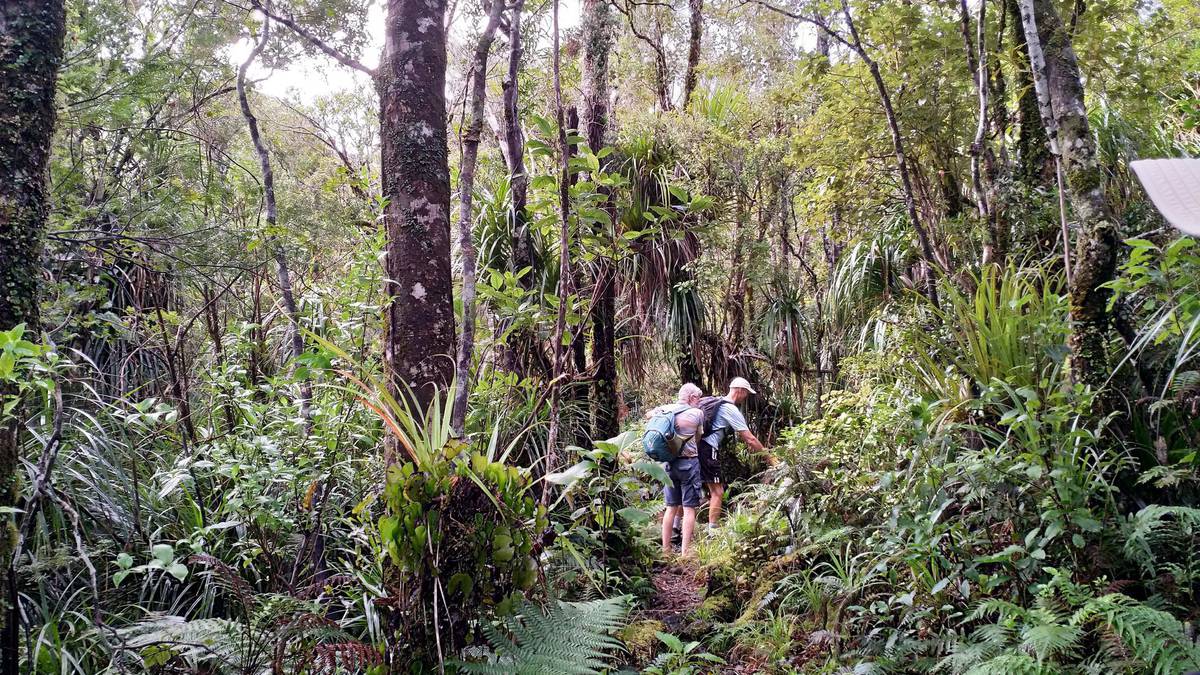“Nature nourishes and supports us. It’s as simple as that,” says Haines, who is pictured with a fellow walker at the Waiotemarama Waterfall Track. Photo / Yvonne Wood
Weekly walks with his tramping group have long been an essential part of living well for John Haines.
For eight years, Wednesdays have been reserved for experiencing beautiful places between the Far North, Whangārei and Opononi.
“It’s exercise of course, but it’s far more than that,” he said.
“It allows a deep appreciation of the natural world, which makes you feel grateful to be alive.
“And it connects you to a group of like-minded and like-hearted people.
“We’re human, we’re social animals, and we need connection. And in today’s world, it seems very easy to get disconnected.”
Haines shared his experience of the inextricable links between walking, being in nature, friendship and wellbeing in light of Mental Health Awareness Week (September 26 -October 2).
According to the Mental Health Foundation (MHF), one in five New Zealanders experiences a mental illness and/or addiction each year, but with the right tautoko (support), many people can and do recover.
Haines said he had been depressed before, so knew how it felt and what was required to shake off the funk.
“There’s a heaviness, a darkness that comes with depression,” Haines said.
“There’s a physical sense of not wanting to move. So movement is critical.
“By going outside and sharing places you love with other people, you reacquaint yourself with those places that are special to you, and to places within yourself that are special.
“Nature nourishes and supports us. It’s as simple as that.”
Everything that Haines shared about his experience of walking was echoed by MHF’s theme for this week: Reconnect – with the people and places that lift you up – hei pikinga waiora.
The organisation’s MHAW 2022 Guide features daily activities for adults and tamariki that can be done anywhere.
It was inspired and informed by leading Māori health advocate Sir Mason Durie’s Te Whare Tapa Whā and the Five Ways to Wellbeing, which are simple, evidence-based strategies to improve wellbeing.
MHF chief executive Shaun Robinson emphasised paying attention to our mental wellbeing wasn’t just for people who hadn’t experienced mental illness, or for those who were okay and wanted to be doing a bit better.
“It’s for everyone,” Robinson said.
“MHAW is an opportunity to tune into your mental health and wellbeing, reconnect with the people who lift you up and places that are special to you, and notice how this makes you feel.”
/cloudfront-ap-southeast-2.images.arcpublishing.com/nzme/5ORVWBS4OO2N3WPOH7COJYFXT4.jpg)
Robinson spoke not only from professional expertise, but from personal experience.
He said through living with bipolar disorder, he had learned that positive lifestyle habits were the most important part of getting and staying well.
“At least two to three times a year, my symptoms really bite me, often in the form of pretty severe depression and anxiety,” Robinson said.
“Yes, medications are important to helping me control that.
“But lifestyle factors are absolutely as important, if not more important, to helping me live well regardless of the fact that I have bipolar.”
The MHAW guide also features journal prompts and space for reflection, to help people start to notice the relationship between what occurs in the mind and the body.
Robinson was in his fifties when he started learning about this connection and said he was blown away there were things he could do to change how he thought, felt and functioned in the world.
“It was exciting and liberating,” he said.
“And I wished someone had introduced me to this when I was 16.
“It would have absolutely helped me cope with and manage what’s happened in my life a lot better.”
Robinson also said living the change was not a one-week wonder, and encouraged people to interact with the guide for as long and as often as they felt the benefit from doing so.
“We all have to face pressures and stresses and struggles, but we can manage those by having habits and behaviours in our lives that boost our mental health,” Robinson said.
“This week is just a reminder to get an experience of this, feel how good it is, and keep going.
“Like your physical fitness, you need to keep working at it, and keep doing things that build it up.”
To learn more about MHAW, and to access free resources including the guide and a “How to have a safe and supportive kōrero resource”, go to mhaw.nz.
Those interested in joining a tramping group can contact one of the following three, catering to differing capacities and inclinations:
• To join long, challenging walks on Wednesdays, contact Yvonne Wood by text or phone on 0212641945.
• For lighter walks ending in a cafe visit on Thursdays, contact Kathryn Russell on 09 4080490.
• And to join monthly Saturday walks, contact Margaret West at margaretwest@xtra.co.nz.




